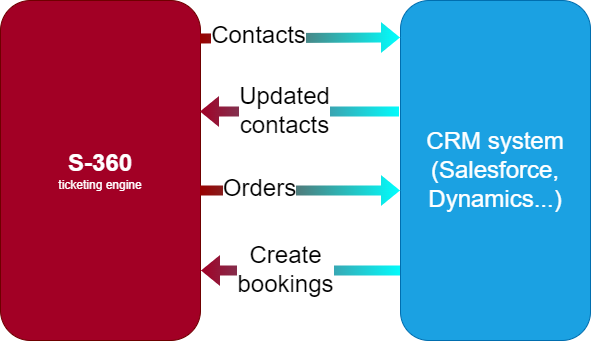CRM integration reference architecture
Table of Contents
Integrating your CRM system with S-360

You are the owner/maintainer of a CRM system (named ExtCRM in the following lines) and you want to integrate it with the S-360 instance having the following institution code: myvenue.
We expect this integration to provide the following features:
- Synchronisation of contact data from S-360 to ExtCRM
→ if a contact is created/updated in S-360, we want the modification to be pushed to ExtCRM. In S-360 a contact represents either a person or a company.
- Synchronisation of contact data from ExtCRM to S-360
→ if a contact is created/updated in ExtCRM, we want the modification to be pushed to S-360.
- Synchronisation of order data from S-360 to ExtCRM
→ if an order is finalized (closed or abandonned) in S-360, we want the content of the order to be pushed to ExtCRM. In S-360 an order represents a transaction between a contact and the institution. This transaction can be a sale, a refund, an option, a reservation...
- (Optional) creation of bookings from ExtCRM in S-360.
→ The ExtCRM operator wants to create an offer (sales or reservation) in the ticketing system.
The following document indicates how to activate the integration between ExtCRM and S-360, using S-360 standard mechanisms for all of the four streams described above.
Non-functional aspects
Data pushed from S-360 are synced every 15 minutes.
Data updates from ExtCRM to S-360 through S-360's APIs must comply with API rate limits.
If you plan to synchronize loads of data from ExtCRM please check with S-360's platform team to validate your load scenarios.
Pre-requisites
URLs to push data from S-360 to ExtCRM
ExtCRM provides 2 urls to which data will be POSTed from S-360.
- Contact synchronization URL. Example: http://extcrm.com/s360/contacts/myvenue
- Orders synchronization URL. Example: http://extcrm.com/s360/orders/myvenue
Take note that, in the examples above, ExtCRM provides a different URL for each of the data streams (contacts, orders, access control checks). The URL also includes mention of the institution code (myvenue) of the S-360 instance.
That design easly allows to integrate ExtCRM with other S-360 instances using different institution codes.
All those URL must accept an array of JSON objects. If the payload is accepted, the URL must answer by a 200. If it is not accepted, it must answer with a different code. In that case, the same payload will be retried at the next call.
Authentication mechanism to push data from S-360 to ExtCRM
ExtCRM must provide the authentication mechanism for the URLs defined above.
S-360 supports the following authentication mechanisms when pushing data to remove systems:
- No authentication,
- Basic authentication,
- API Key
URLs to change data in S-360 from ExtCRM
The domain and subdomain of the urls to call the webservices will be:
- for production: https://myvenue.ws.secutix.com
- for pre-production: https://myvenue.pp-ws.secutix.com
Where myvenue is the institution code of the S-360 instance.
Webservices protocols and authentication
Please refer to that page
1. Contacts stream from S-360 to ExtCRM
The contact stream is put in place using S-360 contact webhook mechanism.
Please follow that link to discover the structure of the contact payload and explore the options of that mechanism: Contact webhook
New contacts will be pushed every 15 minutes, with a maximum of 500 contacts at every execution and a maximum of 50 contacts per payload.
2. Contacts stream from ExtCRM to S-360
This stream is using the contact public APIs of S-360.
Please refer to that page for more information: Contact API
3. Orders stream
The order stream is put in place using S-360 order webhook mechanism.
Please follow that link to discover the structure of the orders payload and explore the options of that mechanism: Order webhook
Finalized orders will be pushed every 15 minutes, with a maximum of 500 contacts at every execution and a maximum of 50 orders per payload.
4. Creating bookings in S-360
This stream is using the orders public APIs of S-360.
Please refer to that page for more information: Contact API
This API can be used to (open orders, create sales or simple reservations](/backend/sales).
First time synchronization
Once the data flow is set up and tested, please determine, in accordance with the operators of myvenue the depth of past data to be retrieved: the date of the oldest dara to be retrieved.
Example: 01/01/2019
Which means that contacts updated before that date, orders created before that date will not be pushed to ExtCRM
S-360 team will do the appropriate set-up to synchronize those data.
Other technical approaches
Other technical approaches which necessitates developments or services on S-360's side are explored in that document. Possible architectures for CRM integrations